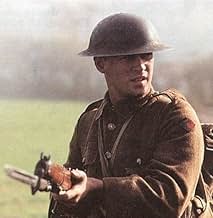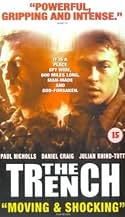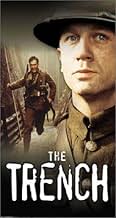IMDb RATING
5.9/10
4.6K
YOUR RATING
June 1916. The British Army is planning a big offensive in the Somme region in France. We follow a platoon of British soldiers as they sit in a forward trench, anxiously awaiting the order t... Read allJune 1916. The British Army is planning a big offensive in the Somme region in France. We follow a platoon of British soldiers as they sit in a forward trench, anxiously awaiting the order to go over the top.June 1916. The British Army is planning a big offensive in the Somme region in France. We follow a platoon of British soldiers as they sit in a forward trench, anxiously awaiting the order to go over the top.
- Awards
- 2 wins & 2 nominations total
Antony Strachan
- Pte. Horace Beckwith
- (as Anthony Strachan)
- Director
- Writer
- All cast & crew
- Production, box office & more at IMDbPro
Featured reviews
World War I has been very neglected by the movie industry, so that fact in itself makes this film slightly "unusual". While it's impossible to say how "accurate" this depiction of life in the trenches really is, to my eye the sets, the uniforms, the equipment etc. looked pretty impressive. However, I did have a problem with the gratuitous use of the "f" word, which all the characters seemed to use more and more as the film went on. I have nothing at all against "bad language" in a movie if it's in the right context, but swearing just for the sake of it just gets boring after a while - and more to the point, did young British men nearly 90 years ago REALLY say "f**k" all the time, as young men these days seem to? I would guess not. As a youngster I knew a number of old soldiers (elderly neighbours, great uncles and the like) who had actually fought in the First World War, and I don't recall ever hearing one of them use even mild profanities. So to my ear, much of the banter between the young soldiers in the movie seemed somewhat anachronistic. I also had a problem with the scene when the troops finally went "over the top" towards the end of the movie. Instead of marching across a devastated, shell-cratered moonscape which was typical of World War I battlefields, we had them marching across a very lush, green English field bearing not a single scar of war!!! This, and the complete absence of enemy troops in the movie (apart from the solitary prisoner brought back from a night raid) betrayed the film's low budget. A moderately interesting film that has you sympathising with the characters by the end, but I won't be going out of my way to give it a second viewing and I'm glad that I saw it on TV, rather than spending hard-earned money on the DVD. 5 out of 10.
I am confident that I have never before started a review by complimenting the set designers. Comparing the vintage still photos of soldiers in World War I trenches shown at the beginning of the movie to the trenches in film itself, you can see that somebody with an eye for detail recreated the look of the trench and the costume designers did a good job with the men's uniforms. The bad news is that that is one of this movie's few strong points. For example, the view of no man's land (NML) - the ground between the opposing trenches - shows a green field. It should look like a brown, pock-marked wasteland, which has been captured in many other WW I movies.
The whole effect of "The Trench" is that of a filmed stage play. It could easily be transferred to the stage without losing much and maybe even gaining something. That is to say, the movie is not opened up much. Still, as a WW I buff, I enjoyed it.
The actors are good, and the outline of the story is illustrative of typical situations in the war. However, the specific dialogue might be a little too 1999 rather than 1916. The film does remind us that wars are fought by men who are still boys and concerned about the things young men are obsessed by.
One general situation that jumps out is the promise to the men that they would go into the enemy trenches after bombardment and after previous waves of a British attack and would not encounter any living enemy. (Mopping up, as my WW-II-veteran father called it.) But this was a typical false promise of the strategy used by both sides because the defenders would always cover themselves adequately so a majority would survive the bombardment, and they would almost always be able to get reinforcements into the trenches faster than attackers could make it across NML, and the preliminary bombardment would 1) warn the defenders an attack was coming and 2) chew up the ground making it harder for the attackers to cross, including merely rearranging the barbed wire instead of cutting through it. The result was that being the defender was always advantageous, and being the attacker was always disadvantageous in trench warfare. That's why most of the battle lines on the Western Front remained static for about four years.
I would recommend this movie as worth seeing for world war buffs and Daniel Craig fans, although it likely won't be anyone's favorite movie.
The whole effect of "The Trench" is that of a filmed stage play. It could easily be transferred to the stage without losing much and maybe even gaining something. That is to say, the movie is not opened up much. Still, as a WW I buff, I enjoyed it.
The actors are good, and the outline of the story is illustrative of typical situations in the war. However, the specific dialogue might be a little too 1999 rather than 1916. The film does remind us that wars are fought by men who are still boys and concerned about the things young men are obsessed by.
One general situation that jumps out is the promise to the men that they would go into the enemy trenches after bombardment and after previous waves of a British attack and would not encounter any living enemy. (Mopping up, as my WW-II-veteran father called it.) But this was a typical false promise of the strategy used by both sides because the defenders would always cover themselves adequately so a majority would survive the bombardment, and they would almost always be able to get reinforcements into the trenches faster than attackers could make it across NML, and the preliminary bombardment would 1) warn the defenders an attack was coming and 2) chew up the ground making it harder for the attackers to cross, including merely rearranging the barbed wire instead of cutting through it. The result was that being the defender was always advantageous, and being the attacker was always disadvantageous in trench warfare. That's why most of the battle lines on the Western Front remained static for about four years.
I would recommend this movie as worth seeing for world war buffs and Daniel Craig fans, although it likely won't be anyone's favorite movie.
This movie is an unusual type of war movie. 99% of the movie is shot inside of this 8 foot wide, 600 mile long trench, filled with British soldiers just only becoming men. It has a sense of claustistiphobia, and itensity among young men that are practically scared to death about the world around them, and every little thing counts. This movie was very intense, and you couldn't take your eyes off it for a moment. 8.8 out of 10.
Strangely this film has grown on me and I'm not sure why but still have a hate for it. The acting is fairly sound and it has some good moments but there isn't much feel for realism. For a start the trenches would have been infested with rats and lice and from what I've read about The Somme it seemed a lot more draumatic than what was portrayed in this film. It just looked too clean. The main hardship they had experienced was boredom, not relentless rain and the constant madness of bombardments. Also what was the point of capturing a German and then not interrogate him, but give him a fag and then let him go? Another wrong point is that the battalions would have been from the same region. Yeh, I'm being picky but why the scots were with southerners and northerners I don't know. The end of the film is the worst. Surely if there had been nights of endless shelling you'd expect to see some shell holes when going over the top? Could of had a nice picnic on that land. Shame, if the director had read more relevant books it could have been really good.
I went considerably out of my way to be the only woman in the theater to see "The Trench" from Britain, a conventional continuation of the British obsession with World War I as being the most symbolic war. Not much new here that wasn't in "All Quiet on the Western Front" or "Paths of Glory" or "Gallipoli", but I suppose some lessons need illustrating for new generations.
Taking place claustrophobically in the trenches just prior to the bloody Battle of the Somme with the sounds of war all around--though it could also have been taking place in the canals of Mars against aliens-- the characters are typically class-based Brits (from ineffectual aristocratic officer to working class blokes whose conversations need subtitles for American viewers), but manage to stay above stereotypes through excellent acting (with actors familiar to us from PBS's "Mystery" and "Masterpiece Theater") and personalization.
I'm probably the only one other than Daniel Craig's family (and the webmasters at his fan site) who went to see the movie for him, but his career soldier sergeant in particular is a real human being.
Otherwise, as always with ensemble war movies, I have trouble telling the young guys in uniform apart to keep the characters straight.(originally written 12/2/2000)
Taking place claustrophobically in the trenches just prior to the bloody Battle of the Somme with the sounds of war all around--though it could also have been taking place in the canals of Mars against aliens-- the characters are typically class-based Brits (from ineffectual aristocratic officer to working class blokes whose conversations need subtitles for American viewers), but manage to stay above stereotypes through excellent acting (with actors familiar to us from PBS's "Mystery" and "Masterpiece Theater") and personalization.
I'm probably the only one other than Daniel Craig's family (and the webmasters at his fan site) who went to see the movie for him, but his career soldier sergeant in particular is a real human being.
Otherwise, as always with ensemble war movies, I have trouble telling the young guys in uniform apart to keep the characters straight.(originally written 12/2/2000)
Did you know
- TriviaIn preparation for the film, Writer and Director William Boyd sent the main cast to a replica trench for a night, to experience the conditions the British Army suffered.
- GoofsThe shelling of German trenches and the nomansland before the actual attack was immense. First of all the shelling would have been deafening, secondly, the nomansland would have been a moon-like scenery full of craters and barbwire, not a nice meadow.
- Quotes
Pte. Charlie Ambrose: [in a mocking whine] You can tell your grandchildren, I was wounded by a flyin' tooth.
[everyone laughs]
- ConnectionsFeatured in Being James Bond (2021)
- How long is The Trench?Powered by Alexa
Details
- Release date
- Countries of origin
- Languages
- Also known as
- La trinchera
- Filming locations
- Production companies
- See more company credits at IMDbPro
- Runtime
- 1h 38m(98 min)
- Color
- Sound mix
- Aspect ratio
- 1.85 : 1
Contribute to this page
Suggest an edit or add missing content

































